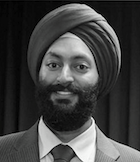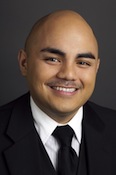Jasjit Singh
Executive Director of Sikh American Legal Defense and Education Fund (SALDEF)
The Sikh American Legal Defense and Education Fund (SALDEF) works to empower Sikh Americans through advocacy, education and media relations. SALDEF’s mission is to protect the civil rights of Sikh Americans and ensure a fostering environment in the United States for future generations. See more here!
Hometown: Schaumburg, IL.
Job Responsibilities: As the Executive Director of the organization, I am involved in a variety of different activities. I am in charge of working with the Executive Board to define and execute our strategy, to build the team, and to hire and manage staff. I also do a lot of organizational development, which is very focused on raising money for the organization.
How did you begin this work (did you college major relate):”]
In college, my major was Business Administration with a focus on Information Systems. I do feel the skills I learned and the classes I took were useful, in that in my current role I have to do a lot of operations, marketing, strategy, some basic level accounting and finances. So having that interdisciplinary knowledge is important.
I started in the private sector as a consultant with Deloitte & Touche for 5 years. It was a great organization where I met some really great people from whom I learned valuable lessons. I worked with many large corporations, also doing great work, that were models of efficiency and scale.
At the end of the day, I did not get a sense of fulfillment from my work. I had friends at SALDEF and heard about their work. I realized I could be doing something more in line with what I am passionate about, and saw my skills as being a natural match for SALDEF. Ultimately, I wanted to make a bigger impact within the Sikh community as well as build a growing team.
Did you always aspire to be where you are now:
No, not really. As I child I never thought, “I want to be the Executive Director of a non-profit.” However, throughout my childhood, I did want to make an impact. I really wanted to help people who needed it. I see that desire to make an impact and help others as the connecting point for my work now.
What work do you hope to do in the future:
I hope to take SALDEF to the next level. I firmly believe our community is at the tip of the spear of many issues, particularly around hate crimes, racial profiling, religious and employment discrimination. The Sikh American community is facing these difficulties on a daily basis. We want to see progress on these issues not just for our communities but for the betterment of all communities nationwide. I want SALDEF to be a vehicle that is pushing that agenda.
How has your identity as APA affected your career path and choices:
I certainly wouldn’t be here without recognition from my community. Up until the age of 16, every leadership position I’ve had were from youth programs that I was exposed to at a younger age. For example, I was involved in leadership programs and later became a camp counselor at Sikh youth camps. It’s not only practice of leadership but also to see others lead. As an undergraduate, I became the founder and president of the Sikh Student Association and learned what it meant to be a leader in context with a community. My first two internships were with Sikh start up companies. At first it is difficult to find positions when you have few credentials. You really learn to lean on your network, which for me, was my community. When I look at the foundation, my leadership skills were cultivated by my community and in the context of serving the community.
What obstacles/ challenges have you faced due to your APA identity:
I’ve been very fortunate in my personal life that I haven’t seen my identity as an obstacle or a challenge, but really as an asset. That being said, from my position, I do see the very real challenges my community faces. It makes me recognize how personally fortunate I have been to have a supportive network.
What is some advice you have for APA interns and young professionals:
Keep your ears and eyes open for mentors. All around you there are people of all ages who will help you along your path, whether it is professionally or personally. They will help you cultivate confidence to realize that you do have, inside of you, a natural genius for something. Mentors around you and your own experiences will lead you. There is a saying, “the best student is the one with the best teachers.” You will learn a great deal.

